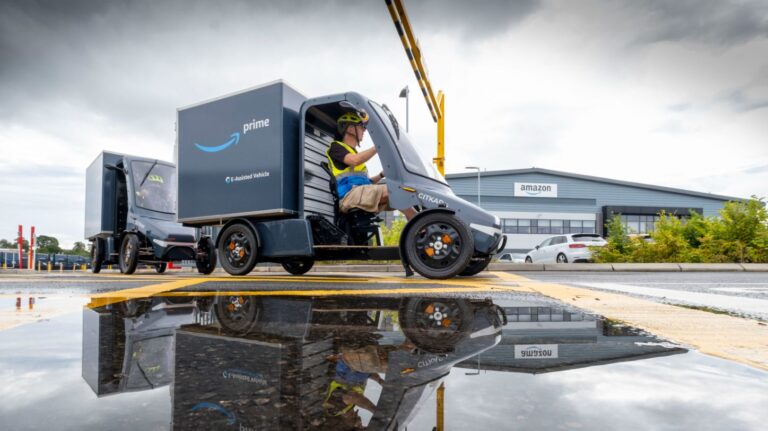A new micromobility delivery hub at Amazon’s Baillieston delivery station in Glasgow will support the launch of e-cargo bikes in the company’s Scottish operations.
The hub is designed to facilitate the delivery of “hundreds of thousands” of Amazon packages using e-cargo bikes across Glasgow in the next year.
Amazon explains that this is part of a wider strategy to electrify and decarbonise its transport network, expecting to rely on e-cargo bikes and walkers to make “around 2.5 million deliveries to Amazon customers across the UK every year”. The company has committed to investing £300 million over the next five years to support this strategy.
Parcels from Amazon are already being delivered on foot and on e-cargo bikes in over 20 UK cities. The new Glasgow hub, however, marks the company’s first deployment of these vehicles in Scotland.
Decarbonisation of transport operations is key to Amazon’s plan to reach its 2040 net zero target, as set out in The Climate Pledge which was launched in 2019.
John Boumphrey, Amazon’s UK Country Manager, explained: “With more than £300 million committed to electrifying and decarbonising our transportation network over the coming years, we remain laser-focused on reaching net zero carbon by 2040.
“The new hub in Glasgow will not only bring our Scottish customers more electric-powered deliveries, but also support the local authority in looking for ways to reduce congestion and find alternative transportation methods. We look forward to expanding our e-cargo bike fleet further in the months ahead.”
Cargo bikes and walkers have become a much more common sight within major cities in recent years, largely due to the appeal of them as a more sustainable alternative to vans and larger delivery vehicles. In preparation for a UPS walking freight trial in London, the Cross River Partnership conducted a study which revealed that this mode of last-mile delivery offered a range of benefits to cities including decongestion, decarbonisation, improved air pollution, improved noise pollution, reduced road danger, and reduced road wear.
Fiona Hyslop MSP, Scotland’s Minister for Transport, is in favour of such projects, saying: “I welcome moves by major businesses to develop micromobility delivery hubs. It’s great news for our cities – for example by choosing e-cargo bikes over vans, businesses can not only reduce carbon emissions but also help remove congestion and improve air quality.
“It’s a smart decision for any organisation, reducing running costs and providing couriers with a healthier and happier way to make deliveries every day. I hope that many more organisations consider the benefits of active travel to deliver goods and services.
“Record Scottish Government investment is transforming active travel infrastructure across the country. Companies that take advantage of this opportunity have much to gain by offering customers faster and more reliable deliveries around our largest cities.”
For more on micro hubs and urban mobility, check out this feature from the August issue of Logistics Manager Magazine, which looks into the benefits and challenges associated with establishing and maintaining micro hubs and urban warehouses.
Don’t forget to book your table for the biggest event in the supply chain calendar: the Supply Chain Excellence Awards! Now in their 27th year, the awards will take place on 9 November at the London Hilton on Park Lane. Click here to find out more about attending or sponsoring!







